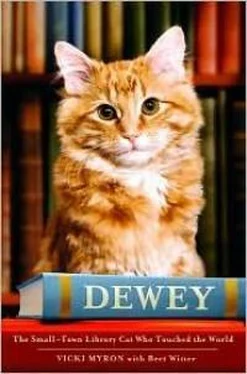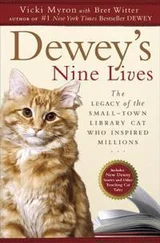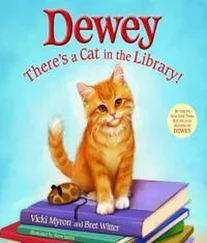We dried it with the blow dryer we used for drying glue at craft time. Within thirty seconds, I was holding a beautiful, long-haired orange tabby. The kitten had been so filthy, I had thought it was gray.
By this time Doris and Kim had arrived, and there were four people in the staff room, each cooing over the kitten. Eight hands touched it, seemingly at once. The other three staffers talked over one another while I stood silently cradling the kitten like a baby and rocking back and forth from foot to foot.
“Where did it come from?”
“The drop box.”
“No!”
“Is it a boy or a girl?”
I glanced up. They were all looking at me. “A boy,” I said.
“He’s beautiful.”
“How old is he?”
“How did he get in the box?”
I wasn’t listening. I only had eyes for the kitten.
“It’s so cold.”
“Bitterly cold.”
“The coldest morning of the year.”
A pause, then: “Someone must have put him in the box.”
“That’s awful.”
“Maybe they were trying to save him. From the cold.”
“I don’t know . . . he’s so helpless.”
“He’s so young.”
“He’s so beautiful. Oh, he’s breaking my heart.”
I put him down on the table. The poor kitten could barely stand. The pads on all four of his paws were frostbitten, and over the next week they would turn white and peel off. And yet the kitten managed to do something truly amazing. He steadied himself on the table and slowly looked up into each face. Then he began to hobble. As each person reached to pet him, he rubbed his tiny head against her hand and purred. Forget the horrible events in his young life. Forget the cruel person who shoved him down that library drop box. It was as if, from that moment on, he wanted to personally thank every person he ever met for saving his life.
By now it had been twenty minutes since I pulled the kitten out of the drop box, and I’d had plenty of time to think through a few things—the once common practice of keeping library cats, my ongoing plan to make the library more friendly and appealing, the logistics of bowls and food and cat litter, the trusting expression on the kitten’s face when he burrowed into my chest and looked up into my eyes. So I was more than prepared when someone finally asked, “What should we do with him?”
“Well,” I said, as if the thought had just occurred to me, “maybe we can keep him.”
Chapter 2
A Perfect Addition

The most amazing thing about the kitten was how happy he was that first day. Here he was in a new environment, surrounded by eager strangers who wanted nothing more than to squeeze him, fondle him, and coo over him, and he was perfectly calm. No matter how many times we passed him from hand to hand, and no matter what position we held him in, he was never jumpy or fidgety. He never tried to bite or get away. Instead, he just melted into each person’s arms and stared up into her eyes.
And that was no small feat, because we didn’t leave him alone for a second. If someone had to set him down—for instance, because there was actual work to do—there were always at least five sets of hands ready to grab him, hold him, and love him. In fact, when I set him down at closing time that first night, I had to watch him for five minutes to make sure he could totter all the way to his food dish and litter box. I don’t think his poor frostbitten feet had touched the ground all day.
The next morning, Doris Armstrong brought in a warm pink blanket. Doris was the grandparent on staff, our mother hen. We all watched as she bent down and scratched the kitten under the chin, then folded the blanket and put it in a cardboard box. The kitten stepped gingerly into the box and curled his legs underneath his body for warmth. His eyes closed in blissful contentment, but he had only a few seconds to rest before someone snatched him up and wrapped him in her arms. A few seconds, but it was enough. The staff had been polarized for years. Now we were all making accommodations, coming together as a family, and the kitten was clearly happy to call the library home.
It wasn’t until late the second morning that we finally shared our little guy with someone outside the staff. That person was Mary Houston, Spencer’s local historian and a member of the library board. The staff may already have accepted the kitten, but keeping him wasn’t our decision. The previous day I had called the mayor, Squeege Chapman, who was in his last month in office. As I suspected, he didn’t care. Squeege wasn’t a reader; I’m not even sure he knew Spencer had a library. The city attorney, my second call, didn’t know of any statutes barring animals from the library and didn’t feel compelled to spend time looking for one. Good enough for me. The library board, a panel of citizens appointed by the mayor to oversee the library, had the final say. They didn’t object to the idea of a library cat, but I can’t say they were enthusiastic. Their response was more “Let’s give it a try” than “Heck, yeah, we’re behind you a hundred percent.”
That’s why meeting a board member like Mary was so important. Agreeing to have an animal in the library was one thing; agreeing on this animal was another thing entirely. You can’t just put any cute cat in a library. If he’s not friendly, he’s going to make enemies. If he’s too shy or scared, nobody will stand up for him. If he’s not patient, he’s going to bite. If he’s too rambunctious, he’s going to make a mess. And above all, he has to love being around people, and he has to make those people love him back. In short, it has to be the right cat.
I had no doubt about our boy. From the moment he looked up into my eyes that first morning, so calm and content, I knew he was right for the library. There wasn’t a flutter in his heart as I held him in my arms; there wasn’t a moment of panic in his eyes. He trusted me completely. He trusted everyone on staff completely. That’s what made him so special: his complete and unabashed trust. And because of it, I trusted him, too.
But that doesn’t mean I wasn’t a little apprehensive when I motioned Mary into the staff area. As I took the kitten in my arms and turned to face her, I felt a flutter in my heart, a moment of doubt. When the kitten had looked into my eyes, something else had happened, too; we had made a connection. He was more than just a cat to me. It had only been a day, but already I couldn’t stand the thought of being without him.
“There he is,” Mary exclaimed with a smile. I held him a little more tightly as she reached out to pet him on the top of the head, but Dewey didn’t even stiffen. Instead, he stretched out his neck to sniff her hand.
“Oh, my,” Mary said. “He’s handsome.”
Handsome. I heard it over and over again the next few days because there was no other way to describe him. This was a handsome cat. His coat was a mix of vibrant orange and white with subtle darker stripes. It grew longer as he got older, but as a kitten it was thick and stylishly long only around his neck. A lot of cats have pointy noses, or their mouths jut out a bit too far, or they’re a little lopsided, but this kitten’s face was perfectly proportioned. And his eyes, those huge golden eyes.
But it wasn’t just his looks that made him beautiful; it was also his personality. If you cared at all about cats, you just had to hold him. There was something in his face, in the way he looked at you, that called out for love.
“He likes to be cradled,” I said, gently sliding him into Mary’s arms. “No, on his back. That’s right. Like a baby.”
Читать дальше













